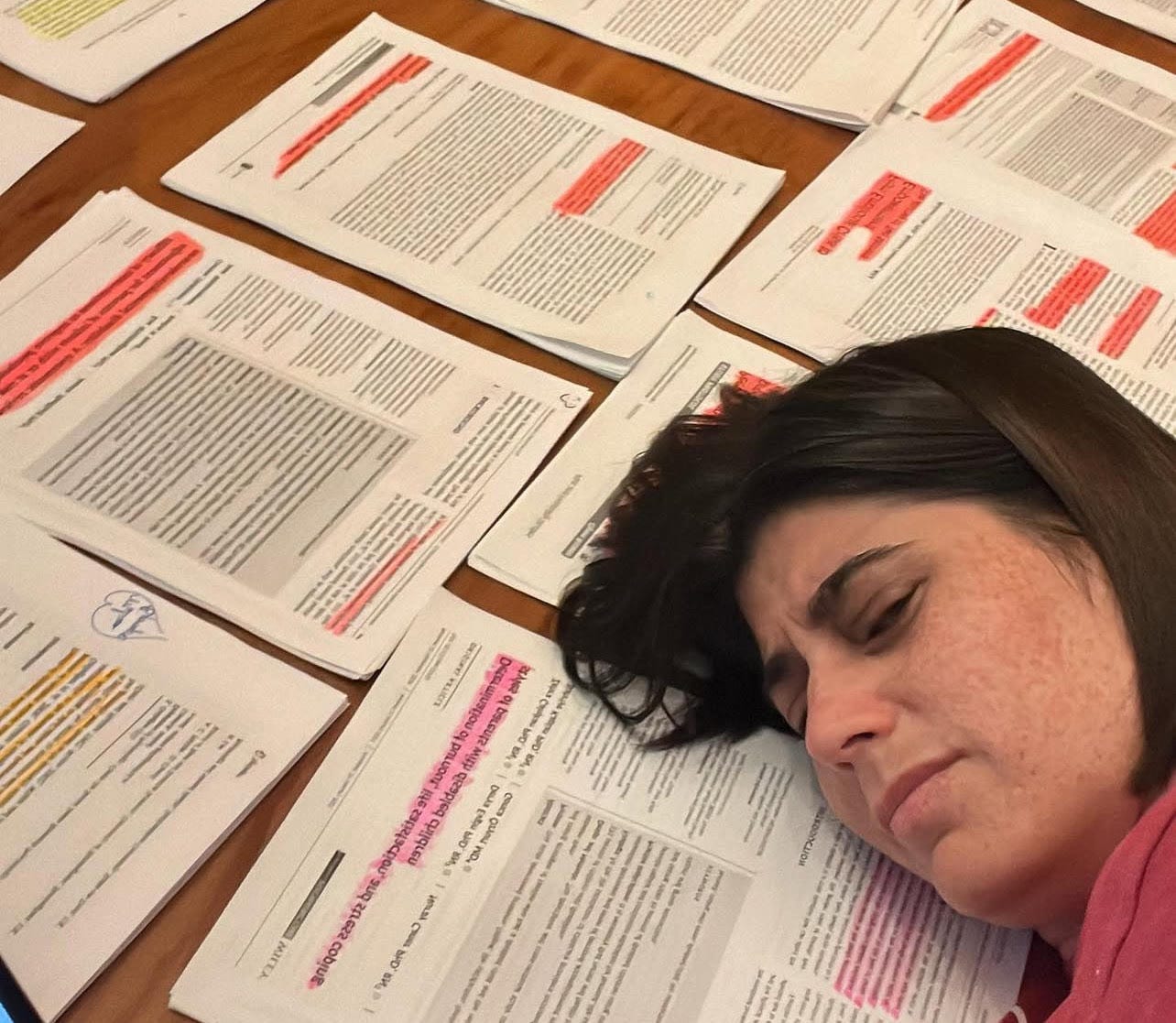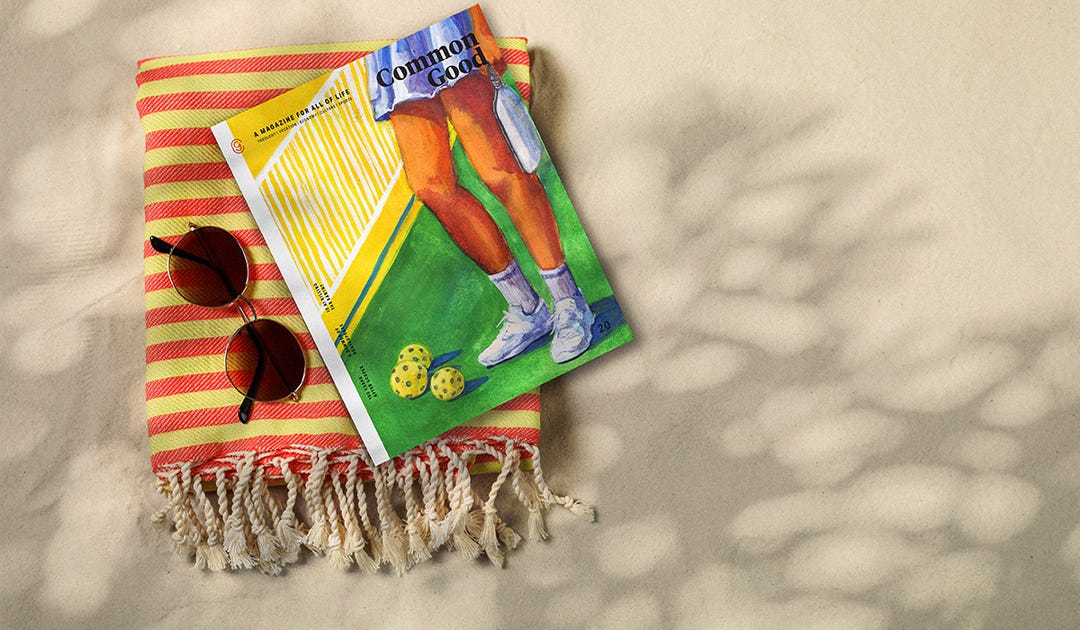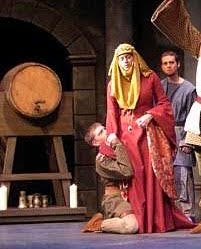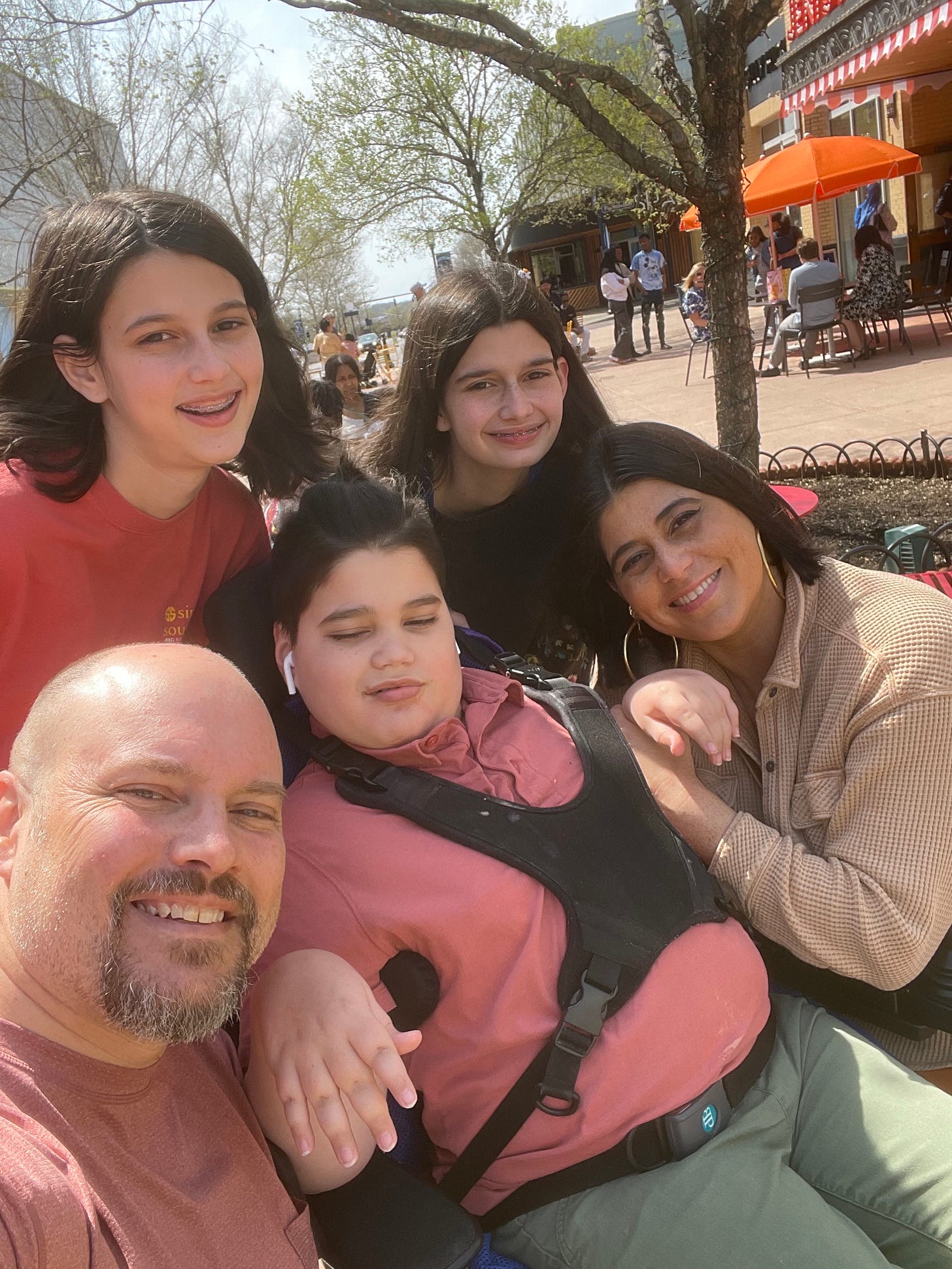An Interview on Calling with Mel Bjorgen
"Moving step by step with God"
I first encountered Mel on Facebook. (Find her newsletter here.) It wasn’t that long ago, but it seems like so much has changed since then, for her and for me. One change is that we both found each other over here on Substack and it’s been a great community for both of us. And a lot has changed for Mel, as you will read below. Mel says she is called to encourage, and I can attest that she really does that in my life. I’m really grateful she fulfills that calling and the others she shares below.
First a note: today’s newsletter (and the rest of this series of interviews on calling) is being sponsored by award-winning Common Good magazine. Common Good offers some of the best writing and analysis out there on art, culture, theology, and—you guessed it—vocation. They are “a magazine for all of life” and honestly, that really does capture the spirit of the publication. Common Good is making a special offer to readers of The Priory (and you won’t believe this): a subscription to the magazine for ONE DOLLAR. Yes, you read that correctly. One buck. Just use this code: KSPCG
I already got mine!
Now, here’s Mel!
Tell us a bit about yourself in a few sentences.
I was born in Puerto Rico but grew up in the Washington, D.C. area of Maryland. I have a very patient and kind husband of 22 years, and three unique and beautiful kids (all teenagers). I graduated with a BA in theatre performance, yet spent most of my adult life as a high school teacher (very briefly), then a missionary in both Belize and Mexico. When we returned from the mission field, I worked as a caretaker, then as a complaints specialist in a hospital, and later as a Suicide Prevention Coordinator. Now I am transitioning to being a Hospital Chaplain.
I have several hobbies— reading, writing, and growing roses. Reading has become a way to continue my education in classic literature, increase my vocabulary, and help me become a better writer. Writing is not my passion, but it serves as an outlet for me to share my stories and alleviate my constant thoughts. Growing and nurturing roses was a pleasant discovery. It’s relaxing for me and gives my mind the mental break it needs, plus it’s such a beautiful hobby!
How do you think about calling (or vocation) generally?
I think calling is a mixture of nature, nurture, and environment. For example, a person can desire to become an artist, but even a natural talent needs to be nurtured for it to blossom into a calling. For true nurturing to happen, a person needs the right environment for their talent to grow—a mentor who notices them, a school that invests in students' gifts, dedicated parents or guardians, or a safe place to exercise their skills. Nature, nurture, and environment do not have to be equal. I think there's a mixture of all in any calling, in whatever proportion they are given. Also, the good news is that nurture and environment can change over time. I believe that is why people realize their calling at different ages. Everyone moves at their own pace, and each person has a different environment to contend with. Sometimes everything falls into place when someone is very young and they can step into their calling, and other times, you're 40 years old, and things begin to come together (umm, me).
How do you think about calling in your own life?
I think of calling as moving step by step with God. I believe God gives us great freedom, allowing us to explore many things in our lives and answer different “callings.” I pray about the things I want to do and move forward. If I reach a point where I can no longer move forward, then I know it’s time to change trajectories. I heed the Holy Spirit by “listening” to His voice; if something does not feel right, I don’t move forward. I also have to consider what I feel called to do in light of what I’m already doing. For example, anything that moves me away from my family would be, to me, the wrong timing to pursue a calling. I am first called to be a wife and mom, so I won’t pursue something that takes me away from that.
What are some primary callings you’ve followed over the course of your life?
· I am called to be the wife of my husband, John. My marriage to him has proven to be a true calling, as I believe God knew I would need his gentle, loyal, and forgiving spirit. We needed each other, really.
· I was called to work in theatre.
· I am called to be a mom of three kids.
· I am called to be a caretaker of my son, who has quadriplegia.
· I was called to be a missionary.
· I am called to be an encourager to people.
· I am called to be a good friend.
· I am called to be a chaplain.
· I was called to move to the city to be close to my church.
· I am called to be an ordained minister.
Have any of those callings changed, ended, or otherwise shifted?
I was drawn to work in theatre from a very young age. It was my major in school. When I graduated, I planned to pursue a Master’s degree in theatre, but I struggled because I thought that if I followed that path, I would be doing what my “flesh” wanted me to do. Ultimately, I decided to give it up. I was talented, and I am so thankful to Mr. Gourley and Mr. Best for believing in me and nurturing that talent for a few years of my life. Now, as an older adult, I realize that anything I do can be an act of service to God, because I am fulfilling the purpose he created me for. I regret not pursuing it. I don’t believe in “no regrets.” I think they can be some of life’s greatest “teachers.” Due to life circumstances and other callings on my life, I never returned to acting, but I do think I will go back to performing one day in a local setting.
My husband and I had hoped our missionary career would last 25 years. During our second term, when we realized that physical therapy would not significantly improve our son's condition, we felt called to leave, and our time overseas ended abruptly.
When I came to the States, I felt very strongly that I was being called to encourage and pray for whoever God placed on my heart. This calling has evolved into a career, friendships, ministry opportunities, and encouragement for my soul as well. It just goes to show you that a calling I viewed as “small” has led me into a fulfilling life.
What difficulties have you experienced in finding or fulfilling a calling in your life?
My past has greatly shaped how I view calling, and I struggled with it for a long time. I believed that if I stepped outside what I was taught, I was doing something wrong. I grew up mainly believing that my calling would be revealed to me in some “Damascus Road” experience. I was taught that God had a perfect will for my life and that I needed to seek it out. It was suggested that I could do anything I wanted as long as I did it “for the Lord.” This meant that any vocation I pursued should include a ministry element that benefited the church in some way. It seemed to me that the most holy way to live was in service to the church as pastors, missionaries, support staff, evangelists, etc. Anyone who was “called” into ministry was considered special. I never thought that being a doctor could be a calling. I saw it as just a job. “True” calling was what people did within the context of Christian ministry or missions. I now see this as a narrow and unimaginative view of calling. When I became a missionary, I realized I was just trying to get through life and survive, like everyone else back in the States.
How has a particular calling surprised you?
The realization that my husband and I would be caretakers to our son for the rest of our lives emerged gradually and slowly within his first few years of his life. Though this is a calling that was given to us rather than pursued, we have embraced it. With the sorrow, there is great joy and purpose. Retirement looks different when you factor in a child who is completely dependent on you. Because we are called to take care of our son, that means we need steady careers with good retirement options so that when the time comes, we are prepared to care for him in the way we desire. For us, our vocations must align with our primary calling: taking care of our son. It’s interesting how calling can have an element of tension to it.
I had never considered becoming a chaplain. Now, I'm about to embark on another journey with the Lord. This calling has been a gradual process for me. I wasn't entirely sure about it at first, but I wanted to choose a career that I would enjoy and that would also provide the benefits I need to help support my family. I thought chaplaincy might be a good fit, and God has shown me with each step that it is. All the technical aspects of this vocation, like training, preparation, and hiring, fell into place. Then, when I doubted whether I could handle the position mentally, God provided me with the confidence I needed through my training, showing me that He has my back. I can do it, and I will.
The most surprising thing is being called to pursue ordination. Most of my chaplain peers will be ordained. So even though that was never a goal of mine, God has provided a path forward to ordination for me that will allow me to minister, I believe, more effectively and efficiently as a chaplain. Also, it may help me realize my dream of living in the country one day when I’m retired, and serving as a care pastor to a small parish of people.
What roles have other people played in helping you discern and follow a calling?
For the past ten years, I’ve been very protective—possibly overly protective—about who I allow to speak into my life. I believe this was a result of overcorrecting from my childhood. It’s only in recent years that I’ve started to let certain people “in” and have been open to considering feedback or simply listening to different points of view. As I’ve shared with others about my calling to be a chaplain, it has been confirmed repeatedly. Additionally, a few close friends have prayerfully supported me through these years as I’ve studied and made decisions about how to move forward.
In this area, the most influential person who has helped me with calling is you, Karen. I think back to something you posted a few years ago about calling, and my heart was open to receive it. Your current book, You Have a Calling, isn't something you pulled out of thin air; it’s something you live and share online. It's interesting how social media, with all its issues, can also serve as a way for the Holy Spirit to work. I also had the chance to talk with you in person once, and although I can't recall all the details, I remember thinking, “Hmmm, well that's a healthy way to see it.” Your practical approach to calling influenced me. I stopped feeling so desperate about it and simply focused on my training, which kept me moving toward what I believe I am called to do. I’m thankful for your boldness on social media and your example of stepping into your calling. I’m also grateful to be a beneficiary of your calling weekly, as I take “class” with you from your newsletters. Thank you for this opportunity to share. I appreciate you, and I am cheering on your book You Have a Calling.
***
Speaking of You Have a Calling, Christianity Today reviewed the book, and you can read that review here. (This is supposed to be a gift link. My apologies if it does not work.) Here’s a snippet:
All that said, my favorite parts of You Have a Calling were the personal anecdotes Prior sprinkles throughout her narrative. She includes accounts of her own vocational shifts, some of which arose from painful choices to remain true to her convictions. These stories demonstrate that she is not merely theorizing and prescribing but also embodying the message she offers. And they reveal that it often requires costly courage to work in ways that are good, true, and beautiful.
The free download of discussion guide for You Have a Calling is now available on my website. Perfect for a book club, class, or your own reflections. Click here.
**
What’s next:
Thanks to my readers who came here for the literary discussions for hanging in while we take a bit of a summer break. We have one more interview on calling next week then …
On September 2 we go back to class!!! We will pick up our reading with the English Neoclassical poet Alexander Pope. We’ll start with An Essay on Man and see what your pleasure is from there, readers. I’m curious if you are familiar with Pope already, and if so if you enjoy him or not. If you don’t know him, I can’t wait to see what you think! Oscar Wilde was not a fan. He famously quipped, “There are two ways of disliking poetry; one way is to dislike it, the other is to read Pope.”
For the old-school readers among us who like to use print books, I’d suggest either this very inexpensive Dover Thrift edition of Pope or this nicer, more complete Oxford World’s Classics edition. All the works we will cover are online, too. I just find it hard to read poetry (or any literature) that way. There are a few works I’d like to cover, but I will wait to hear from you, my readers, to learn if you are Team Pope or Team Wilde!
"Absolutely unmixed attention is prayer.” – Simone Weil1
Simone Weil, Gravity and Grace, trans. By Emma Crawford and Mario von der Ruhr (London: Routledge, 2002), 117.






So much in here that is so good, Mel. I think one of my favorite parts is what you say about regret. “No regrets” always rubbed me the wrong way and you helped me figure out why.
I have a BFA in Theatre and was able to start my own theatre company which lasted about 3 years until my osteoarthritis and fibromyalgia got really bad. I just couldn't manage that company anymore and was disappointed that the actors who wanted to be involved weren't willing to help with things like reading plays to determine what the next season would be.
When that ended I began working on my spiritual life which has blossomed - not because I found anyone to mentor me or become my spiritual advisor. Fr. Richard Rohr began his ministry in the Cincinnati area and I was lucky to hear him preach once a week at a charismatic mass. He moved to New Mexico and started The Center for Action and Contemplation. His teaching is available on YouTube and when I watch him I'm taken back to the late 70-80s at that little charismatic mass.
Over the years, I've become less able to live a physically active life. I've been looking for some direction and calling. Someone posted a scripture verse here on Substack: Jeremiah 29:7 Which (I paraphrase) the Holy Spirit (in the same way you listen for that voice) told me to "bloom where I'm planted" and "its there I will be aligned with God's justice." In that moment, I knew The Holy Spirit was aware and I will always be in exile. My spiritual home is in the air where I am suspended in the mystery of faith. Now that I've said all that, I am 78 years old and in relatively good health aside from my bones and muscles. I don't know how long I have before I'm in a wheelchair, a nursing home, and finally death and going Home. I still think there is something for me to do with God.